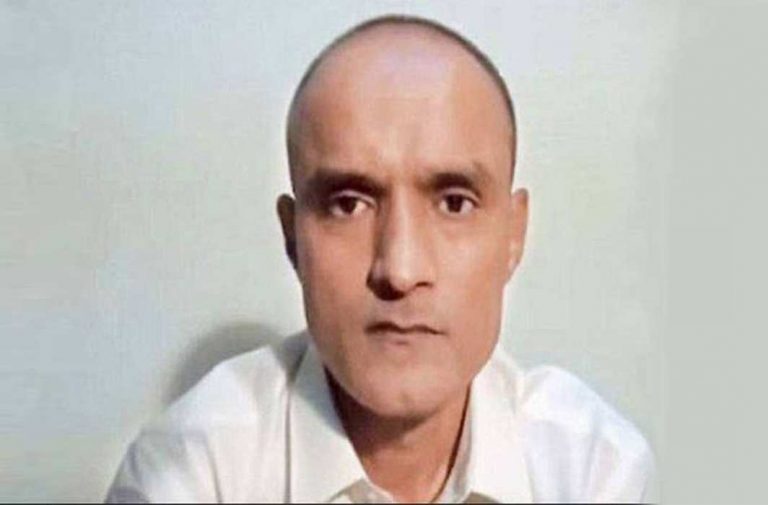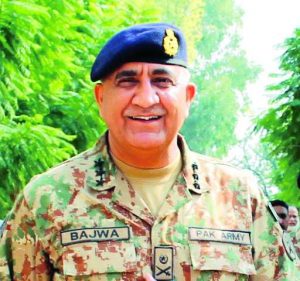
A joint Indo-Pak peoples’ initiative spearheaded by lawyers has been launched to save the officer from the gallows of our neighbour. Is it possible for him to receive a fresh and fair trial?
~By Ajith Pillai
Will Kulbhushan Jadhav, the former naval officer arrested in Baluchistan in 2016 for alleged spying and sentenced to death by Pakistan’s Field General Court Martial (FGCM) on April 10, return home alive? This question has been hounding bureaucrats in the Ministry of External Affairs (MEA) ever since the news of the sentencing hit the headlines. New Delhi has been working overtime to secure the release of Jadhav.
It has communicated to the Pakistan government that if the death sentence is carried out, it would see it as nothing less than “a premeditated murder”. A series of demarches (petitions or pro-tests dispatched through diplomatic channels) have been sent by the Min-istry to Islamabad. India is also trying to build up international pressure to persuade Pakistan to desist from executing the alleged spy.
But far removed from the diplomatic moves, lawyers on both sides of the border are doing their bit to ensure that Jadhav receives a fair public trial. Heading that initiative is the India-Pakistan Joint Defence Committee for Prisoners formed by a group of lawyers in 2014. Its chairman, the ebullient Jammu politician and Supreme Court lawyer, Professor Bhim Singh, has been coordinating with counterparts in Islamabad and Lahore and they have filed a petition in the Pakistan Supreme Court seeking justice for Jadhav. Meanwhile, a PIL filed in the High Court of Delhi urging directions to the MEA to take up the Jadhav matter in the International Court of Justice was dismissed on April 19.
The primary plea on behalf of Jadhav by the India-Pakistan Joint Defence Committee before Pakistan’s Supreme Court is that a review of the FGCM is well within the ambit of the law. According to the petition, Section 7 (2.3) of the Pakistan Army Act is categoric that “Military Court convicts can have decisions (of the Military Court) reviewed by Civilian Courts”. And under the provision of the constitution of Pakistan, “any affected person has a fundamental civil right to challenge a decision by any Forum/Authority including the Military Court for the enforcement of fundamental rights/civil rights of any person”.
But to present Jadhav’s case, lawyers of the Joint Defence Committee need a copy of the order of the military court which they have not been provided so far. According to Bhim Singh, that is the primary obstacle. “Before we get a move on, we have to get a copy of the judgment of the Military Court. We must know the nature of the evidence against him and why the death penalty was awarded,” he told India Legal.
It was Pakistan Army Chief General Qamar Bajwa who confirmed Jadhav’s death sentence through a press note. But the judgement of the Military Court was not made public.
According to the petition: “The only accusation against Indian national namely, Kulbhushan Jadhav was narrated in a statement by the Pakistani Military Publicity Wing, Inter Services Public Relations (ISPR), which said that Jadhav was declared guilty of waging war against the country (without naming the country).” The judgement and the sentencing were also communicated in a terse note by the ISPR on April 10. The operative part is quoted in the petition: “Today Chief of Army Staff General Qamar Javed Bajwa confirmed his (Kulbhushan Jadhav) death sentence awarded by FGCM.”

Of course, the Pakistan media has been carrying confessional video statements of Jadhav in which he has admitted that he functioned as a RAW agent in Baluchistan and was coordinating “anti-state” activities with Baloch separatist groups. India has rejected the confessions as being false and extracted through coercion. It maintains that the former naval officer was kidnapped from Iran where he was conducting business and presented as a spy to counter Indian arrests of ISI operatives in Delhi. It also dovetailed with Islamabad’s script that Indian agents were active in Baluchistan. The truth or otherwise of the Pakistani charge and India’s counter should have come up in an open court and ought to have been subjected to legal scrutiny.
So why was Jadhav sentenced in such haste and in an in-camera trial? One theory doing the rounds was that it was in response to an ISI official, Lt Col Muhammad Habib Zahir, disappearing from Nepal in the first week of April. He was stationed there to allegedly coordinate covert operations in India. Pakistan links his going missing to Indian agents active in Nepal. Such tit-for-tat is not uncommon among intelligence agencies.
While Bhim Singh is hoping for the best and cites his association with cases in which he has managed to free prisoners held illegally on both sides of the border, much will depend on how the Pakistan Supreme Court responds to the petition. In cases where military concerns come into play, it is feared that justice often eludes the accused.
In fact, it is only in instances of fishermen or civilians unwittingly straying into “enemy” territory that both Pakistan and India have shown leniency. Over 500 Pakistani fishermen arrested for straying into Indian waters have been released in recent years. An equal number from India have been set free and repatriated by authorities across the border. But they were not arrested on charges of espionage. More importantly, the army and the ISI were not interested in them.
To know the latest development, read India files petition against Kulbhushan Jadhav’s death sentence

